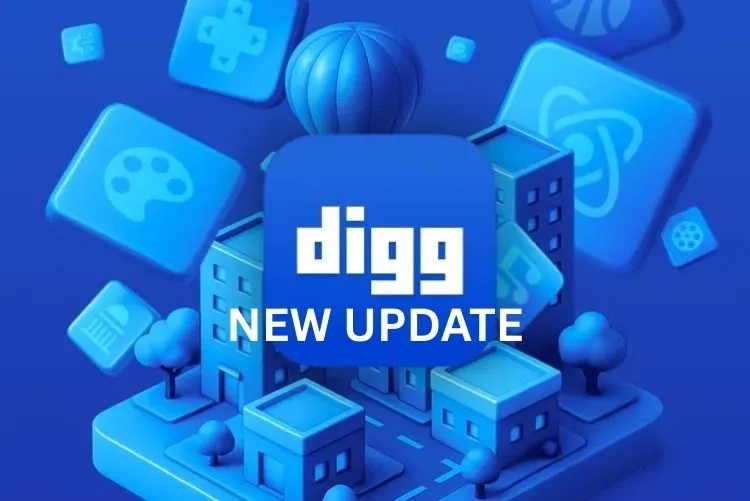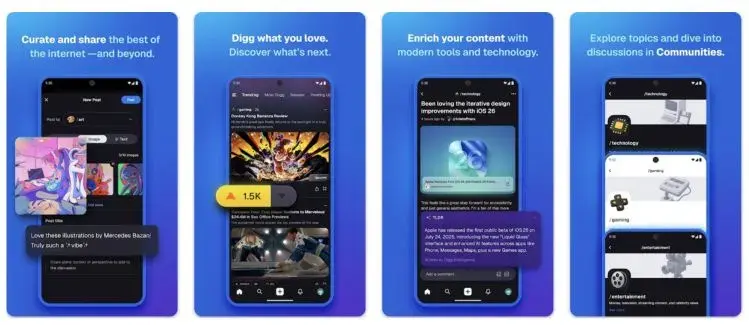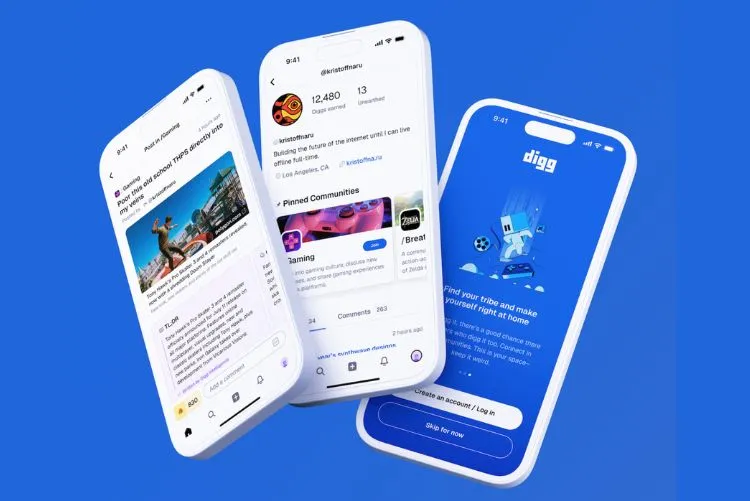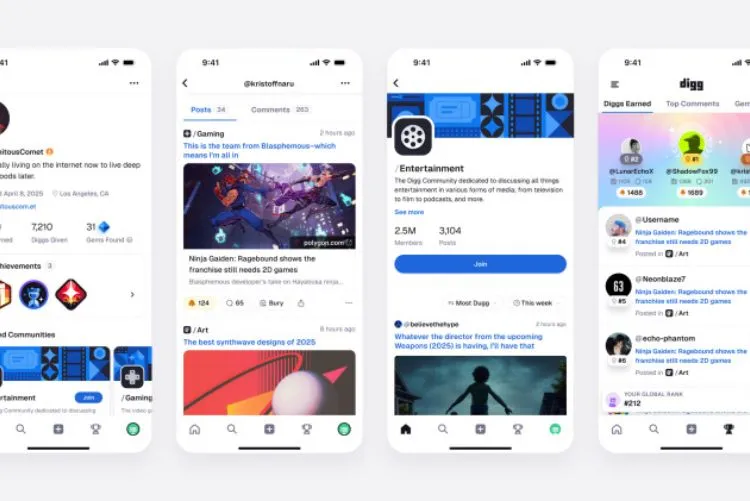Digg’s New App Review – Simple Start with Big Potential

Digg, one of the internet’s earliest social news platforms, is trying to make a big comeback. Big names like Digg cofounder Kevin Rose and Reddit cofounder Alexis Ohanian are supporting the company. Their vision is to bring Digg back as “the homepage of the internet,” just like it once was in the mid-2000s. While it’s still very early days and the platform is invite-only, Digg has now launched its new mobile apps. I tried the iOS version to see what the experience is like, and here’s a closer look.
Digg Returns with Familiar Style
The new Digg works in a way that feels very similar to Reddit. People can submit links, and other users can comment on them and vote. Instead of “upvotes,” Digg uses the word “diggs.” Posts with more diggs move up higher in the feed, giving them more visibility.

There is also a “bury” button, which works differently from Reddit’s downvote. On Digg, the bury option doesn’t directly punish the post but instead tells the system to show you less of that type of content in your own feed. It’s more like a personalization tool than a dislike button.
This mix of voting and commenting is the same formula that made platforms like Reddit popular. Digg is betting that bringing back its own version of this system, with a fresh design and new features, will attract users again.
Categories and Communities

When you open the Digg app, you land on the Home tab, which has four main sections:
-
Trending
-
Most Dugg
-
Newest
-
Heating Up
“Trending” shows what’s popular across the site, while “Most Dugg” highlights the most-voted links. “Newest” lists the latest posts, and “Heating Up” is where fresh posts that are quickly gaining traction show up. The difference between “Trending” and “Heating Up” isn’t very clear, but the Heating Up section feels more immediate, almost like a real-time spotlight.
Users can also choose between two modes: My Feed and All Digg. My Feed shows posts only from the communities you follow, while All Digg brings content from across the platform. At this stage, Digg only has a small number of communities, such as
-
/AMA
-
/art
-
/digg
-
/diggnation
-
/entertainment
-
/finance
-
/food
-
/funny
-
/gaming
-
/lifestyle
-
/music
-
/news
-
/offbeat
-
/politics
-
/science
-
/sports
-
/technology
It’s not a huge list yet, but it does cover a wide range of interests. There’s also a scrolling carousel of posts under the main categories, though it’s not always clear how those links are selected.
Inside a Post

Tapping on a post brings up more details. If the post includes a link, you can see the text, an image, and the link itself. One of the most interesting parts is the AI-powered “TL;DR” summary at the bottom of the post. Digg calls this feature “Digg Intelligence.” It automatically creates a short version of the content so you can understand the key points quickly without reading everything.
So far, the summaries look accurate and useful. This small but smart feature feels modern and could make Digg stand out compared to Reddit and other platforms. Under each post, you’ll also see threaded comments, which you can dig or bury just like the main links.
Early Impressions
Since Digg is still in an invite-only stage, the platform feels a bit quiet compared to larger social networks. There aren’t thousands of posts flying in every second like on Reddit or Twitter. Instead, it feels like a smaller, more focused community.
The design of the app is clean and simple. Navigation is easy, and the categories are well-organized. The bury button, being more of a personalization tool, is a nice touch, since it lets you shape your own feed without necessarily punishing the person who posted.
The app is not overloaded with features yet, which makes it straightforward to use. That simplicity could either be seen as a strength, making it beginner-friendly, or as a limitation when compared to platforms with more advanced tools.
Can Digg Really Come Back?
The big question is whether Digg can truly return as an internet leader. Back in the early 2000s, Digg was hugely popular, but it lost ground to Reddit and other platforms because of product missteps and community dissatisfaction. Now, with the support of Kevin Rose and Alexis Ohanian, the company has credibility and financial backing.
The timing may also be in Digg’s favor. Many users today are frustrated with Reddit and are looking for alternatives. With social media in constant flux, there is room for a fresh platform that offers a mix of curated news, community discussions, and personalization.
If Digg continues to expand its communities, polish its app, and attract a larger user base, it has the chance to be relevant again. The inclusion of AI features like Digg Intelligence suggests that the team is thinking about modern user needs.
Final Thoughts
Digg’s new app is indeed basic, but it’s a promising start. The voting system, the categories, and the early use of AI summaries all point to a product that could grow into something bigger. Right now, it feels like a clean and lightweight version of Reddit, with the potential to carve out its own identity.
It’s still early, and much will depend on whether Digg can attract active communities and keep improving the app. But for now, the return of Digg is exciting for those who remember its old glory days and for new users who want a fresh social platform.
In short, Digg may not be the homepage of the internet again just yet, but this new app shows that it’s serious about trying.

![Aquamanga Site- A Hidden Gem of Biodiversity and Beauty [2024] Aquamanga Site](https://mediatalky.com/wp-content/uploads/2024/04/Aquamanga-Site.jpg)
![ThreadsDeck: Move to Enhance Instagram’s User Experience [2024] ThreadsDeck](https://mediatalky.com/wp-content/uploads/2024/06/ThreadsDeck-768x576.jpg)
![Is Cinemark Movie Club Worth It Or Not? [2024] Cinemark Movie Club](https://mediatalky.com/wp-content/uploads/2024/03/cinemax-1-768x439.jpg)


![What UV Index Can You Tan In- Understand And Save Your Skin [2024] what uv index can you tan in](https://mediatalky.com/wp-content/uploads/2024/04/what-uv-index-can-you-tan-in-768x439.jpg)